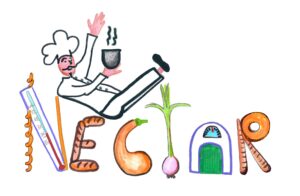In order to support the implementation of NECTAR pilot courses, an Educational Toolkit has been set up on iMoox. This educational platform is based on the open-source software MOODLE2, one of the leading and well-known learning management systems in educational institutions worldwide (e.g. universities). iMooX can be easily accessed from all major operating systems (e.g. Android, Windows) of different devices, like tablets, PCs and smartphones.
After a user-friendly registration process on the platform (click here to download a simple guide ) two courses (MOOCs – Massive Open Online Courses) are available free of charge and accessible to everyone:
This MOOC has been created to integrate the lessons implemented in presence in NECTAR pilots. Since it addresses pilot students, educational resources are available both in English and in pilot languages (DE, IT, NL and PT).
The course, structured into 2 Units, allows a more “general view” on the role of food and nutrition in the human body and related processes.

In Unit 1 of this MOOC we address, among other topics:
– the role of nutrients and food in a life-course approach;
– the physiology of taste and smell and how these sensatory capacities influence food uptake;
– the process of eating per se;
– basic knowledge on swallowing disorders.
Unit 1 of this MOOC is shaped as “basic knowledge” for attendance in Unit 2.
Unit 2 of this MOOC guides students through more detailed content on cooking and how to make tasty dishes for older people, based upon knowledge collected in Unit 1. It also focuses on how to best monitor your clients’ or customers’ satisfaction with the food you deliver.
Please find below the materials of the iMooX course, which can be downloaded for free:
– Glossary Taste and smell (PDF)
– Food allergies and intolerances (PowerPoint)
Please find below the link to the course playlist of the iMooX course videos on YouTube:
Chefs in future integrated health care course playlist

This MOOC has been developed in order to train the future trainers of courses based on NECTAR Curriculum.

It is structured into 4 main Units in English language.
Unit 1 introduces the iMooX platform in general and the specific areas of the NOTT.
Unit 2 provides an introduction to the NECTAR project and to the main design tools that teachers should refer to when implementing pilot courses.
Unit 3 focuses on the lesson plans developed in the framework of the NECTAR project, providing support to teachers so that they can use them effectively.
Unit 4 focuses on the Training Patterns developed in the framework of the NECTAR project, providing support to teachers so that they can use them effectively.
Materials shared through the NOTT course are also available for download here below. With the appropriate licenses, online users (e.g. teachers) can reuse them in their own courses.
Please find below the link to the course playlist of the iMooX course videos on YouTube:
NECTAR Online Training of Trainers course playlist
In particular, you can find:
1. DESIGN PATTERNS:
NECTAR’s design patterns support teachers to implement some best practices for the implementation of innovative educational strategies; they can be applied transversally to the LESSON PLANS and generally to most Learning Outcomes; they support both face-to-face and distance learning and provide hints about which technologies could be adopted to support both approaches, as well as about the organization of groups of students; they also provide specific indications about which types of Learning Outcomes could be targeted through the implementation of each training pattern.
Below, you can find the list and you can download them for free:
2. LESSON PLANS:
NECTAR’s lesson plans are “templates for lessons” focusing on specific Learning Outcomes and identifying how to address the needed knowledge and skills through specific educational materials and activities; when possible, they also identify some “crucial professional steps/activities characterizing the CGE” which should be targeted by the training in order to ensure that they will be transferred/reproduced by the student in his/her daily practice.
Below, you can find the list and you can download them for free:
The European Commission’s support for the production of this publication does not constitute an endorsement of the contents, which reflect the views only of the authors, and the Commission cannot be held responsible for any use which may be made of the information contained therein.